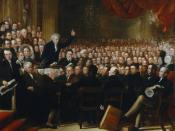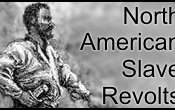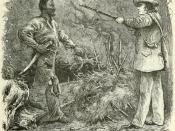Throughout the 1800's America had become divided due to the different stance citizens were taking on issues that were affecting the way the country operated. Some of the more severe clashes between differing groups resulting from such issues as slavery and whether or not it should be aloud to simply die out or if the use of moral persuasion should be used to put an immediate end to the system. People across the country were beginning to take sides on the issue of slavery and how it would be dealt with as the country began to expand rapidly westward.
One idea that was shared by thousands of people, including slaves themselves, was that slavery was never going to end unless it was officially outlawed. The expansion of slavery into the west began to show many that if the system of slavery was not handled properly it would spread across the country with no end.
Feeling that there was no end to slavery insight many began to lead revolts against the very people who were perpetuating the system.
Inspired by a slave uprising in Haiti in 1791 and the ideals of the American Revolution, a small group of slaves planned a widespread, armed rebellion. "Led by Gabriel Prosser, the conspirator's goal was to destroy slavery in Virginia" (Noon 3/4/04).
"The rebels planned the event for the night of August 30, 1800" (Noon). Slaves from Caroline, Hanover, and northern Henrico were to meet just north of Brook Bridge on Brook Turnpike
Once the army assembled, Gabriel's men would kill the plantation owners in the neighborhood to insure the secrecy of the plot. The forces would then proceed to Richmond where they expected to meet fellow troops from Petersburg. As a united group, they would divide with separate missions. One band would...


